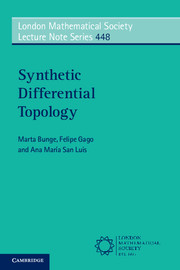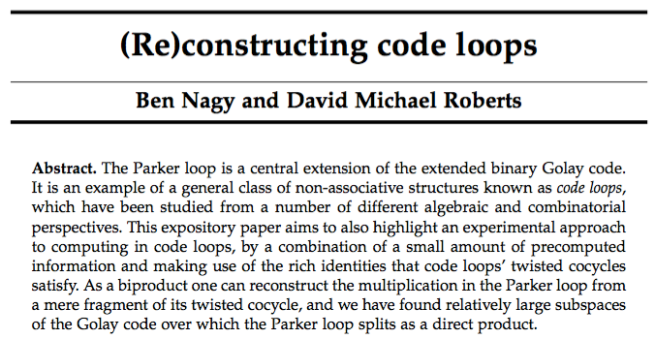Another bunch of universities decline to continue to line the pockets of Elsevier shareholders, this time all the universities in Norway, following the Californian public universities, Swedish universities, and German universities. (via @JanvadeHe on Twitter).
Month: March 2019
SDT book review done
I’ve been reading Bunge, Gago and San Luis’s book Synthetic Differential Topology to review for MathReviews. I’ve finally sent off the written review, to appear here within short order (requires subscription).

On the whole, the book is ok, pretty much self-contained, but could have done with a bit more copy-editing. I think of this as more a fault of the publisher, but given that it’s in a lecture notes series, they probably didn’t give it as thorough a going-over. I’m very much intrigued by the link between Penon’s intrinsic topology on objects of a topos, which plays a big rôle in SDT, and Mike Shulman’s real cohesion, as hinted at in these slides by David Jaz Meyers.
(My thanks to the AMS for the free reviewers copy of the book).
Teaser for the new algebra/combinatorics paper
Ben is a student who did a project with me in the (southern hemisphere) summer of 2016/17. This paper was on ice until now, when he just finished his undergraduate studies, in linguistics and classics, no less.

Now on Twitter, almost
I have created a Twitter account for this blog, @GeometerThe @HigherGeometer.
https://twitter.com/HigherGeometer/status/1102166896508461056
And by linking with the blog, Twitter now demands a phone number to unlock my account as it has detected ‘suspicious activity’. Sigh. I have contacted Twitter to get this sorted.
Something I wrote…
Last year, Inference approached me to write something about the Mochizuki–Scholze–Stix affair. I had to give it serious thought, but in the end accepted. I agree with Peter Woit’s view that venues willing to publish high-end writing about mathematics and physics are too few. When I was a high-school student I devoured my library’s back catalogue of New Scientist, reading up on particle physics, astronomy, etc, learning a lot about current physics. Sadly, it seems to be more of tabloid science these days (really, for the past 15 years or more), or perhaps I just have a more informed view of what is possible in science writing.
Anyway, here’s the essay: A crisis of identification.
Rings
The entire University of California system ditches Elsevier
You can read the press release here. I didn’t know that the UC system produces “nearly 10 percent of all U.S. publishing output”. Another quote from the press release:
“Make no mistake: The prices of scientific journals now are so high that not a single university in the U.S. — not the University of California, not Harvard, no institution — can afford to subscribe to them all,” said Jeffrey MacKie-Mason, university librarian and economics professor at UC Berkeley, and co-chair of UC’s negotiation team. “Publishing our scholarship behind a paywall deprives people of the access to and benefits of publicly funded research. That is terrible for society.”
Added 3 Mar: This long Twitter thread from Michael Nielsen is an excellent, in-depth commentary on the deeper issues in this space.
